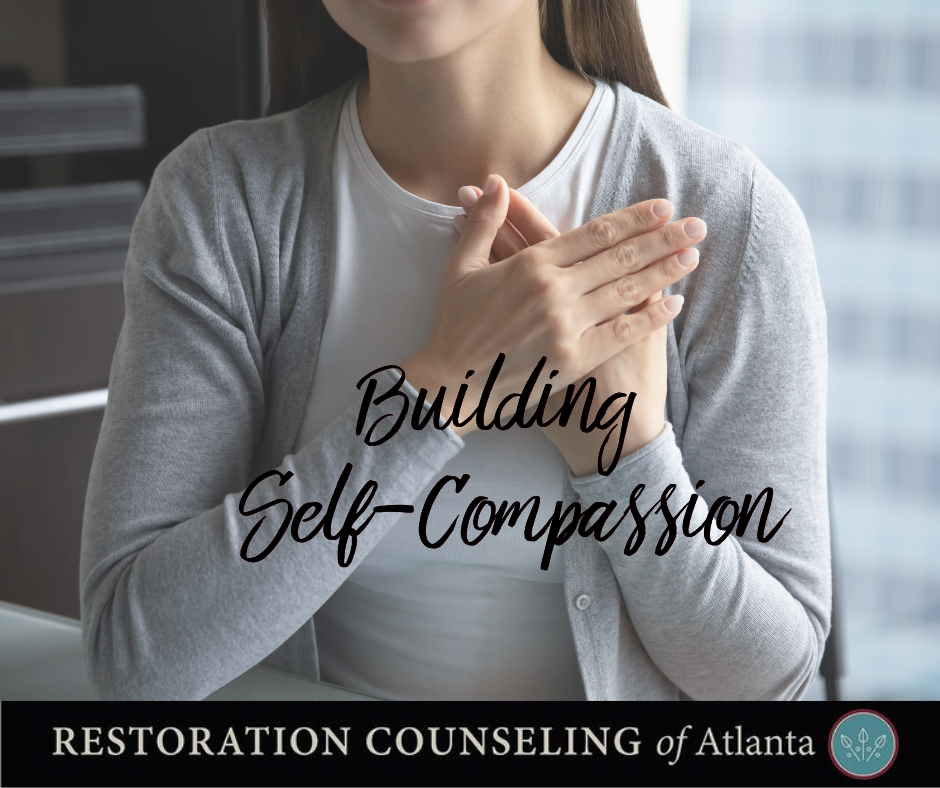When you think about others’ pain and suffering, it seems natural and easy to be compassionate. You probably even do it without a second thought. At the same time, many compassionate people are critical and unforgiving of themselves. They hold themselves to a standard they would never demand from others.
For example, earlier today, I played in a rec soccer match that was fiercely competitive. We had a corner kick late in the second half, and I got the rebound off the goalie’s block. I was so excited, and my thoughts raced with what I was supposed to do—turn, kick, score, right? I turned, and I kicked. But I sent the shot wide while standing right at the goal and all I could do was hang my head in frustration.
As you can tell (because I’m writing about it hours later), this missed shot stayed on my mind. I sit here thinking about what I should have done, the hours of practice I should do this week to get better, and how disappointed my teammates must be that I let them down. I’m criticizing my inability to move my feet as my mind tells me to. I wonder if other players wish I weren’t on offense and wish I had been playing defense instead. And on and on with the mind-reading, unforgiveness, and self-criticism.
So I have a choice here. I can continue to give myself a hard time about my performance and make myself feel bad, or I can get some perspective on it and practice self-compassion.
What is Self-Compassion?
Let’s start with what compassion is. The word compassion literally means to “suffer with.” So, to experience compassion, we must recognize that another is suffering and not ignore or deny it. According to Dr. Kristen Neff (2020), one of the world’s leading experts on self-compassion, compassion moves us to respond to another’s pain, bringing feelings of warmth, caring, and the desire to help the suffering person in some way.
Having compassion also means offering understanding and kindness to others when they fail or make mistakes, rather than judging them harshly. So when we feel compassion for another, it means that we realize that suffering, failure, and imperfection are inherent parts of a shared human experience, not something that demands criticism or shame.
Applying this idea to self-compassion means showing kindness to yourself as you would a good friend. It means accepting yourself for who you are, imperfections and all, especially when you fail, face a struggle, or notice something you don’t like about yourself. It’s about finding a way to comfort and care for yourself during these hard times instead of harshly condemning or breaking yourself down.
While most of us practice self-criticism, as I did after the soccer match, it’s not very helpful. On the other hand, being kind to yourself supports good mental health and healthy relationships and reduces self-criticism so you can forgive yourself, which frees you to learn and grow.
What Self-Compassion is Not
Self-compassion is not self-pity. Self-pity exaggerates the extent of personal suffering, while self-compassion focuses on the related experiences of self and others without feelings of isolation and disconnection. Nor is self-compassion the same as self-indulgence. Some believe self-compassion inevitably leads to laziness and rejection of all responsibility and accountability. However, such behavior is self-indulgence, a practice that focuses on short-term and self-centered gain. Self-compassion, conversely, works toward authentic growth and development, creating happiness and health in the long term.
Self-compassion is not self-esteem (though it does support healthier self-esteem). Self-esteem refers to our sense of self-worth, perceived value, or how much we like ourselves. It relies on self-evaluation, often in comparison to others. There is little doubt that low self-esteem is problematic and often leads to depression and lack of motivation. However, pursuing higher self-esteem can also be problematic as it drives narcissism and self-absorbed behavior. It can distort or hide personal shortcomings and emotional instability since the basis of their worth is inconsistent and artificial.
Self-compassionate people feel compassion for themselves because all human beings deserve compassion and understanding, not because they possess a particular set of traits or accomplishments. Their self-compassion also allows for greater self-clarity because personal failings can be acknowledged and accepted with kindness and do not need to be hidden.
It’s about understanding that you are a work in progress, with strengths and weaknesses, and knowing that is perfectly okay!
How to Practice Self-Compassion
Dr. Neff (2020) identified three elements of self-compassion: self-kindness, mindfulness, and common humanity.
Self-kindness means being gentle with ourselves rather than harsh, accepting rather than judgmental. It has to do with our self-talk, self-care, and self-soothing.
Mindfulness means holding our experience in accepting awareness without resistance or attachment. We don’t try to avoid our pain, nor do we let it define us.
Common humanity means connecting with other people through our shared experience of suffering rather than isolating ourselves. When we recognize that suffering is simply part of our common humanity, we feel less alone, and the suffering feels less intense.
Putting Self-Compassion into Action
Here are some suggestions to move toward healthier thinking and self-compassion:
- Notice your self-talk. Many of us say things to ourselves that we would never say to someone else, which keeps us perpetually struggling.
Sharon Martin (2020) writes, “Self-criticism is like a bad habit – the more we do it, the more it gets hardwired into our brains and becomes an automatic thinking pattern. Alternatively, we can use self-compassion to rewire our brains and change these thinking patterns. We can learn to respond to our mistakes and flaws with kindness and understanding instead of self-criticism and blame, which allows us to begin to see ourselves in a more positive light.”
To speak to your self compassionately and break critical thinking patterns, you should do so in a non-judgmental, supportive way. Remain mindful of what is true for us in the moment, and recognize that we are not alone in our suffering.
For the next week, notice when you’re being self-critical or feeling bad about yourself, and write down what your inner critic is saying as accurately as possible. What are the actual words you use to talk to yourself? What are the areas in which you are critical of yourself? Then reframe your self-talk when you catch yourself being critical by looking at the facts. You can use 3×5 cards and put the critical statement on one side and the facts on the reverse.
The bottom line is this: if it’s not acceptable to say to someone else, it’s not acceptable to say to yourself!
2. Have a fair, not perfectionistic, attitude toward yourself. Practicing self-compassion means treating yourself warmly, gently, and fairly. It’s about having an attitude of acceptance toward yourself—rather than judgment—and treating yourself accordingly. So when you mess up, try to see the situation with compassion for yourself instead of self-criticism. Check the facts that you’re running through your head to allow grace and self-forgiveness, which builds motivation to try again.
3. Don’t take other people’s opinions of you too seriously. It’s natural to want people to like you. But, if you believe other people’s opinions over your own, you risk compromising your authenticity and well-being by trying to accomplish the impossible task of keeping everyone else happy. Your opinions and thoughts are just as important and valid as everyone else’s, so give yourself credit and validation, too! It’s okay to be curious about others’ thoughts and ideas, but don’t feel you must agree with them to keep peace, out of a lack of self-confidence, or out of a need to be self-critical.
People who are self-compassionate accept themselves for who they are rather than who they “should” be. Not only that, but they often take pride in their unique characteristics.
4. Similarly, avoid mind-reading! When you make assumptions about what others are thinking of you and your mistakes, you usually reflect and amplify what you think of your errors. You lose sight that others are offering compassion to you, which perpetuates your suffering and robs others of the chance to be kind to you.
5. Take care of yourself. Even when life gets busy, it’s essential to look out for your health and happiness and take care of your needs. This means eating regular meals, getting enough sleep, taking time for fun and relaxation, or whatever you need.
Caring for yourself requires a balance between immediate needs and long-term goals. Sometimes long-term goals will require discomfort, such as studying or exercising when you’d rather relax on the couch. There’s no simple answer for how much discomfort or sacrifice a person should make—it depends on the individual and their goals. But it’s important to be aware of your own needs and find a balance that works for you.
6. Ask for help. One of the kindest things you can do for yourself is to ask for help when you need it. It’s unrealistic to think you can do it all and never need a helping hand. Healthy relationships understand that humans are meant to be interdependent and have a give-and-take to care for one another’s needs. And healthy people understand that asking for help isn’t a sign of weakness or inferiority but a sign of confidence and trust.
7. Notice what you’re doing “right.” The human brain is wired to notice our mistakes and flaws, so it takes more work to see what we’re doing “right.” At the end of each day, take a few minutes to reflect on what went well or what you’re proud of, even small things like getting to work/school on time or taking the steps instead of the elevator. There is much more that you do right in a day than wrong, and giving yourself credit for it will build your confidence and keep things in perspective.
8. Give yourself a treat. Self-compassion can take the form of doing something nice for yourself. Often, we think treats have to be earned (like I have to do all my work before I can watch that show). Rewards have their place, but treats are things you give yourself for no particular reason.
Remember that self-compassionate treats need to be good for you (so, drinking a bottle of wine doesn’t really count). Try asking yourself what you really need right now and see if you can give that to yourself. Chances are you’ll feel better when you take care of yourself and sprinkle in more treats.
Final thoughts
Changing critical habits can be hard and take time, but with practice, such reflexes can be unlearned and replaced with self-compassion. Start with one practice, set realistic goals, and allow yourself to feel good! Then add more practices as it becomes easier to think and act with self-compassion.

by Paige Santmyer, MA LPC NCC CCATP
Roswell location
paige@restorationcounselingatl.com, ext. 157
Paige provides a safe and comfortable atmosphere where clients can explore the challenges they are facing. She also believes in addressing the individual’s entire personhood, assessing needs in all domains of life instead of focusing solely on mental health needs. Paige works with adults and teens around depression, anxiety, mood disorders, relationship issues, parenting struggles, and life transitions.
Reference
Ingheim, M. (2020). Out of love: Finding your way back to self-compassion. Berkeley, CA: She Writes Press.
Martin, S. (2020). Change self-criticism into self-compassion. PsychCentral. Retrieved on June 1, 2020, from https://blogs.psychcentral.com/imperfect/2020/05/change-self-criticism-into-self-compassion/
Martin, S. (2019). 3 Self-compassion exercises. Retrieved on January 25, 2021 from https://www.livewellwithsharonmartin.com/mental-health-resource-library/
Neff, K. (2022). What is self-compassion. Retrieved from: https://self-compassion.org/the-three-elements-of-self-compassion-2/#definition
Winnig, S. (2021). How to practice self-compassion. TherapistAid. Retrieved on October 13, 2021, from https://www.therapistaid.com/therapy-article/how-to-practice-self-compassion

